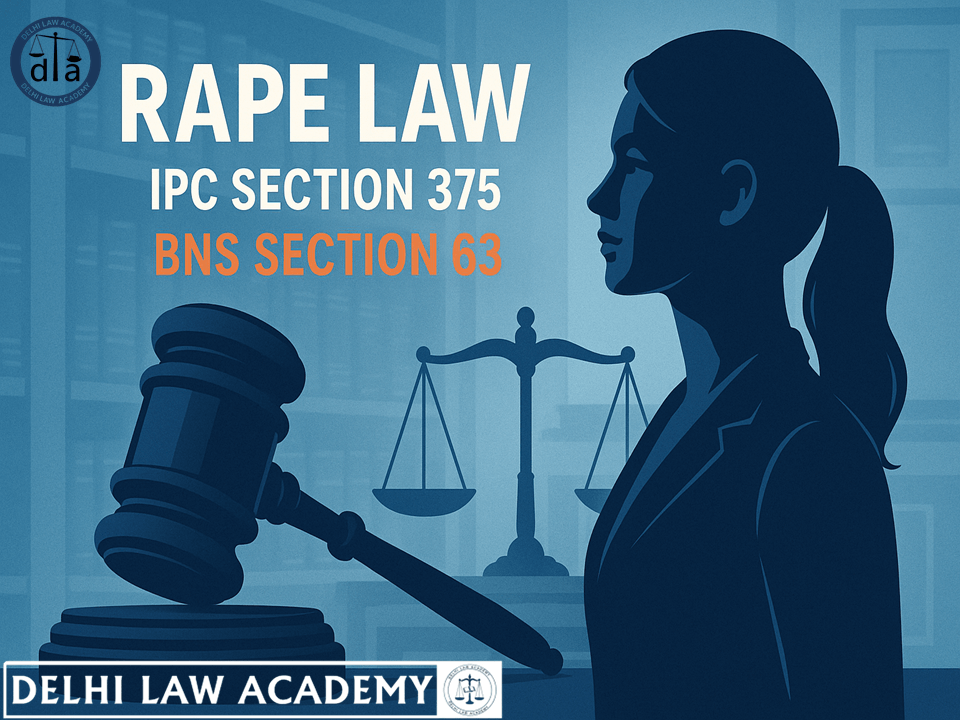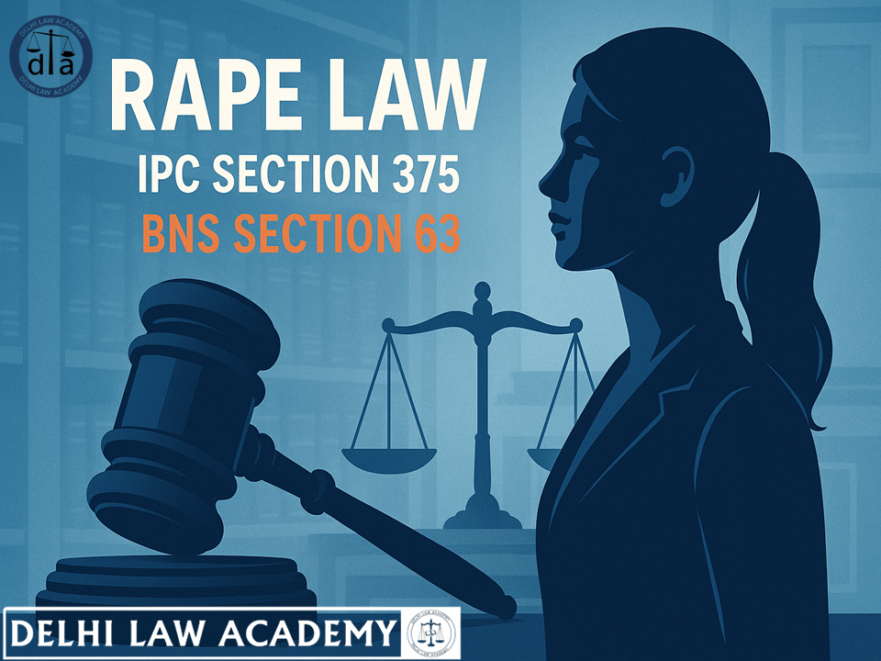
📘 Topics Covered in this Blog
- 🔹 Provisions of Section 375 IPC explained
- 🔹 Supreme Court on scope of Section 375 IPC
- 🔹 Section 63 BNS explained
- 🔹 BNS provisions corresponding to Section 375 IPC
- 🔹 Rape of a woman by a man
- 🔹 How Section 65 BNS corresponds to Section 375 IPC
📚 BNS & IPC Provisions on RAPE
Delhi Law Academy Jaipur presents below for aspirants of RJS, DJS, PCS(J) and other Judicial Services throughout India a short Note on BNS and IPC provisions on RAPE.
⚖️ CHAPTER V: OF OFFENCES AGAINST WOMAN AND CHILD
Section 63 BNS: Section 375 IPC
RAPE Defined
- A man is said to commit “rape” if he:
- (a) penetrates his penis, to any extent
- into vagina, mouth, urethra or anus of a woman or makes her to do so with him or any other person
- (b) inserts any object or a part of body, not being the penis
- into vagina, urethra or anus of a woman or makes her to do so with him or any other person
- (c) manipulates the body of a woman to cause penetration
- into vagina, urethra, anus or any part of body of such woman or makes her to do so with him or any other person
- (d) applies his mouth
- to vagina, anus, urethra of a woman or makes her to do so with him or any other person
- under circumstances falling under any of these seven descriptions:
- (i) against her will
- (ii) without her consent
- (iii) with her consent when her consent has been obtained by putting her or any person in whom she is interested in fear of death or of hurt
- (iv) with her consent when the man knows that he is not her husband and that her consent is given because she believes that he is another man to whom she is lawfully married or she believes herself to be lawfully married
- (v) with her consent by reason of unsoundness of mind or intoxication or administration by him personally or through another of any stupefying or unwholesome substance she is unable to understand the nature and consequences of that to which she gives consent
- (vi) with or without her consent when she is under eighteen years of age
- (vii) when she is unable to communicate consent
📝 Overhauling of Section 375 IPC
The definition of rape was substantially changed by the Criminal Laws Amendment Act 2013 w.e.f. February 2013.
What is rape?
- The offence of rape in its simplest term is “the ravishment of a woman, without her consent, by force, fear or fraud” or as “the carnal knowledge of a woman by force against her will”.
- In the crime of rape, “carnal knowledge” means the penetration to the slightest degree of the organ alleged to have been carnally known by the male organ of generation
Meaning of sexual intercourse
Dictionary meaning of the words “sexual intercourse” is heterosexual intercourse involving penetration of the vagina by the penis.
The earlier definition of rape did not include other forms of penetration such as penile/vaginal penetration, penile/oral penetration, penile/anal penetration, finger/vaginal and finger/anal penetration, and object/vaginal penetration, within its ambit.
Sakshi, an organisation to provide legal, medical, psychological or other help or charitable support for women, in particular those who are victims of any kind of sexual abuse or harassment or violence, had filed a writ petition under article 32 of the Constitution for inclusion of all forms of penetration in the definition of rape by judicial interpretation. This was rejected by the Supreme Court in 2004.
However, with the change in definition of rape in 2013, now all forms of penetrations are characterized as rape. And even non-penetrations.
Effect or consequences of rape
- The physical scar may heal up, but the mental scar will always remain. When a woman is ravished, what is inflicted is not merely physical injury but the deep sense of some deathless shame.
💡 Rape Victim Testimony & IPC Provisions
Delhi Law Academy Jaipur presents below for aspirants of RJS, DJS, PCS(J) and other Judicial Services throughout India insights on rape victim testimony, corroboration, and relevant legal provisions.
👩⚖️ Is corroboration required for testimony of a rape victim?
No.
The testimony of the victim in rape cases is vital and unless there are compelling reasons which necessitate looking for corroboration of her statement, the courts should find no difficulty to act on the testimony of a victim of sexual assault alone to convict an accused where her testimony inspires confidence and is found to be reliable.
In the Indian setting refusal to act on the testimony of the victim of sexual assault in the absence of corroboration as a rule is adding insult to injury.
To insist on corroboration except in the rarest of rare cases is to equate one who is a victim of the lust of another with an accomplice to a crime and thereby insult womanhood.
It would be adding insult to injury to tell a woman that her claim of rape will not be believed unless it is corroborated in material particulars as in the case of an accomplice to a crime.
Courts cannot cling to a fossil formula and insist upon corroboration even if, taken as a whole, the case spoken of by the victim of sex crime strikes the judicial mind as probable.
If the totality of the circumstances appearing on the record of the case discloses that the prosecutrix does not have a strong motive to falsely involve the person charged, the court should ordinarily have no hesitation in accepting her evidence.
🔹 The reason
A girl or a woman in the tradition bound non-permissive society of India would be extremely reluctant even to admit that any incident which is likely to reflect on her chastity had ever occurred.
She would be conscious of the danger of being ostracized by the society and when in the face of these factors the crime is brought to light, there is an inbuilt assurance that the charge is genuine rather than fabricated.
Just as a witness who has sustained an injury, which is not shown or believed to be self-inflicted, is the best witness in the sense that he is least likely to exculpate the real offender, the evidence of a victim of sex offence is entitled to great weight, absence of corroboration notwithstanding.
📝 Assurance may be required
The court while appreciating the evidence of a prosecutrix may look for some assurance of her statement to satisfy its judicial conscience, since she is a witness who is interested in the outcome of the charge levelled by her, but there is no requirement of law to insist upon corroboration of her statement to base conviction of an accused.
If for some reason the court finds it difficult to place implicit reliance on her testimony, it may look for evidence which may lend assurance to her testimony, short of corroboration required in the case of an accomplice.
❌ Is a rape victim an accomplice?
No, a woman or a girl who is raped is not an accomplice. Corroboration is not the sine qua non for conviction in a rape case.
It must not be overlooked that a woman or a girl subjected to sexual assault is not an accomplice to the crime but is a victim of another person’s lust and it is improper and undesirable to test her evidence with a certain amount of suspicion, treating her as if she were an accomplice.
🔍 Is the past conduct of the rape victim relevant?
Even if the prosecutrix, in a given case, has been promiscuous in her sexual behaviour earlier, she has a right to refuse to submit herself to sexual intercourse to anyone and everyone because she is not a vulnerable object or prey for being sexually assaulted by anyone and everyone.
⚠️ Consequences of rape
A rapist not only violates the victim’s privacy and personal integrity, but inevitably causes serious psychological as well as physical harm in the process.
Rape is not merely a physical assault, it is often destructive of the whole personality of the victim.
A murderer destroys the physical body of his victim; a rapist degrades the very soul of the helpless female
📜 Law of England on marital rape
The rule that a husband cannot be criminally liable for raping his wife if he has sexual intercourse with her without her consent no longer forms part of the law of England since a husband and wife are now to be regarded as equal partners in marriage.
The Sexual Offences (Amendment) Act, 1976, defines rape as having “unlawful” sexual intercourse with a woman without her consent.
The word “unlawful” is to be treated as mere surplusage and not as meaning “outside marriage”, since it is clearly unlawful to have sexual intercourse with any woman without her consent.
✔️ Can clause fourthly be applicable when the complainant knew that the man was already married?
Yes, as per Supreme Court in Bhupinder Singh v. U T of Chandigarh:
- Though it is urged with some amount of vehemence that when the complainant knew that he was a married man, clause “fourthly” of Section 375 IPC has no application, the stand is clearly without substance.
- Even though, the complainant claimed to have married the accused, which fact is established from several documents, that does not improve the situation so far as the accused-appellant is concerned.
- Since, he was already married, the subsequent marriage, if any, has no sanctity in law and is void ab-initio. In any event, the accused-appellant could not have lawfully married the complainant.
🧾 Requirements of clause thirdly
- For the proposition that the requisite consent was lacking, it would have to be shown that the girl had been put in fear of death or hurt and that was the reason for her consent. [Source: Tukaram v. State of Maharashtra]
📘 Stay Ahead with Delhi Law Academy!
Get access to free monthly current affairs, read our insightful blogs,
and explore free study resources prepared by experts at DLA Jaipur. 🚀
❓ FAQs on Rape Law & IPC Provisions
No. The testimony of the victim is vital. Courts should act on the statement of the victim alone if it inspires confidence and is reliable. Corroboration is not mandatory.
No. A woman or girl who is raped is not an accomplice. She is the victim of another person’s lust. Courts should not test her evidence with suspicion.
Even if the prosecutrix had prior sexual relations, she has the right to refuse sexual intercourse. Past conduct does not make her vulnerable to sexual assault.
Rape causes serious physical and psychological harm. It affects not just the body, but also the personality and dignity of the victim. The trauma can last a lifetime.
Under Section 375 IPC (clause fourthly), the law applies even if the accused is married. A subsequent marriage of the accused is void ab-initio. Consent must be free and voluntary.
The court may seek assurance of the victim’s statement to satisfy its conscience, but there is no legal requirement for corroboration. Evidence can be accepted based on credibility alone.
Contact us
📍 Delhi Law Academy – Jaipur Branch
6C, Tower 2, Coaching Hub, Pratap Nagar, Jaipur – 302033
📞 Phone:
+91 9911916552
+91 8447285606
✉️ Email:
contactus@delhilawacademy.com

